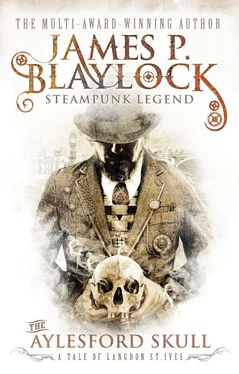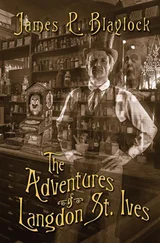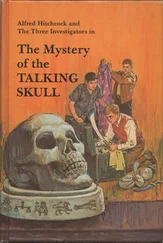James Blaylock - The Aylesford Skull
Здесь есть возможность читать онлайн «James Blaylock - The Aylesford Skull» весь текст электронной книги совершенно бесплатно (целиком полную версию без сокращений). В некоторых случаях можно слушать аудио, скачать через торрент в формате fb2 и присутствует краткое содержание. Жанр: sf_stimpank, на английском языке. Описание произведения, (предисловие) а так же отзывы посетителей доступны на портале библиотеки ЛибКат.
- Название:The Aylesford Skull
- Автор:
- Жанр:
- Год:неизвестен
- ISBN:нет данных
- Рейтинг книги:5 / 5. Голосов: 1
-
Избранное:Добавить в избранное
- Отзывы:
-
Ваша оценка:
- 100
- 1
- 2
- 3
- 4
- 5
The Aylesford Skull: краткое содержание, описание и аннотация
Предлагаем к чтению аннотацию, описание, краткое содержание или предисловие (зависит от того, что написал сам автор книги «The Aylesford Skull»). Если вы не нашли необходимую информацию о книге — напишите в комментариях, мы постараемся отыскать её.
The Aylesford Skull — читать онлайн бесплатно полную книгу (весь текст) целиком
Ниже представлен текст книги, разбитый по страницам. Система сохранения места последней прочитанной страницы, позволяет с удобством читать онлайн бесплатно книгу «The Aylesford Skull», без необходимости каждый раз заново искать на чём Вы остановились. Поставьте закладку, и сможете в любой момент перейти на страницу, на которой закончили чтение.
Интервал:
Закладка:
But walking away wasn’t in her. She had come too far. She pushed the door wide and stepped through boldly, purposefully ignoring Narbondo who sat in a chair regarding her. She took in the room at a glance – the crates of books, the heaps of papers, the mean furnishings, the bare walls, as if the abode were merely temporary, the books and papers residing in the wooden crates that they had arrived in, ready to be carried out on the instant. She saw that a second immense window with curtains hanging to either side stood in the rear wall, bowed inward, weak with age. A second door, barred with a timber, stood adjacent to it, the window and the door looking back toward the hovels in the farther courtyard. Through the window she could see in the hazy moonlight what appeared to be the first few yards of a narrow, wooden suspension bridge leading away across the rooftops, or perhaps into a distant building.
There was a second room beyond the one in which she stood. Through its open door part of a long workbench was just visible, the top littered with tools and pieces of equipment that conveyed nothing to her mind. There were more wooden packing crates disgorging excelsior, and the place had an odious chemical reek. She heard what sounded like footsteps from within the room, someone pacing, and she got a brief glimpse of a man who peered out at her for an instant. It seemed to her that he wore a wig, and that his chin whiskers were false.
On the table, in front of her only living son, lay two plates, covered in broken meat and bones, potatoes and congealed gravy. She regarded Narbondo openly now. She compelled her mind into a cold objectivity, closed against sentiment. She could see in his face very little of the boy she remembered, which was hidden by a malignancy that he had purchased dearly over the years. He exuded an unnaturally vile essence – not an odor, but something very much like it – a palpable, repellent evil.
Her eyes returned to the table. Two plates? The man in the farther room, perhaps?
“My small houseguest,” Narbondo said to her, as if knowing what was in her mind. “I’ll introduce the two of you. Edward!” he cried, in a sharp voice.
The name electrified her. From the room beyond there appeared a small boy, four or five years of age, dressed in a white nightgown and black vest. He stood in the doorway, clearly hesitant to come any closer. He was apparently unhappy, although she saw something in his face that might be hope when he looked into her own. He was pushed from behind just then – she saw the sleeve of a black coat, perhaps velvet – and he staggered out toward the table.
“This is my beloved mother,” Narbondo said to the boy. “She hails from Aylesford, and is in fact a neighbor of yours. Say ‘good evening’ to her, Edward.”
“Good evening,” the boy said, and then, after staring at her for another moment, he turned sharply around and disappeared back into the other room.
“I was quite pleased when I discovered the boy’s name,” Narbondo said to her. “Not that the name Edward is in short supply. It’s serendipitous, though. You’ll agree with me there. Our own Edward come again, I thought when I learned of it.”
She stared at him for a moment without speaking, her wits fuddled by the boy’s being there at all. His presence changed things, and she made up her mind – remade it – abruptly. “What I think is of no concern to you,” she told him. “I’ll take the boy with me when I go. I won’t allow you to keep him, if that’s what you had in mind.”
“Not at all what I had in mind, mother. He’s not worth keeping. He’s a dull boy, says almost nothing, can barely read, cannot amuse himself. He can eat, but then a fly or a mouse can eat, so there’s nothing in it to recommend him.”
“What do you mean that he’s a neighbor of mine? Who is the child?”
“The son of a man called Professor Langdon St. Ives and his wife Alice, lately hailing from Aylesford, the old Walton estate. Both of them have long been treasured friends of mine, and so I’ve taken it upon myself to borrow their son. The Professor was at your house, I believe – what was once my house – on the evening of the night that I abducted the boy. He no doubt awoke to his loss in the morning. I very much wish I could have been there to witness it. There’s nothing more amusing than the face of someone happening upon dire knowledge. It effects a change that is imprinted on one’s features forever. My,” he said, smiling broadly now, “this is indeed splendid. Do you realize, mother, that this is the first conversation we’ve enjoyed together in… How long has it been?”
She didn’t answer, but set her parasol on the table and took her handbag from beneath her cloak. She reached into it calmly and drew out a pistol. It had belonged to her husband, and was many years old, although she had kept it clean and oiled so that the barrel wouldn’t be corrupted, and had actually shot it twice after Bill had come to the farm. She had managed to hit a large sunflower at five paces, blowing it to bits in a hail of seeds and petals.
“A flintlock, by heavens!” Narbondo said with mock approval. “ Very fine filigree work. Primed and loaded, I suppose? Half cocked already, if my eyes don’t deceive me. Capital. It’s a foggy night, though, as you no doubt observed when my dear brother – your own Edward – put in his brief but entertaining appearance. You were wise to have stowed the weapon in out of the wet. Damp powder won’t answer, you know, no matter how badly you wish to murder your only living son.”
She said nothing, but kept her mind steady, concentrating on the thing she must do, reminding herself of the man’s manifold crimes, the murder of Edward and of Mary Eastman. Certainly he also intended to murder the poor boy in the other room – to make use of him as he made use of Edward. God knew how many others had suffered at his hand. She felt her own hand shaking, the now-heavy pistol dragging itself downward, and she firmed her grip and raised it again.
“Do you know that I once wept for the loss of your love?” Narbondo said to her.
She stared at him, confounded.
“I recall it with great clarity. It was when Edward was three years old, his birthday, and had acquired some resemblance to a human being rather than a mewling little beast. I felt the turning within you that day, your heart drawn to him, and my share diminished.”
“You imagined that, Clarence,” she said, using his Christian name and watching for any effect that it might have. It apparently had none, except for a thin smile, as if this were a bit of theater to him. She went on doggedly. “It was your imagining that made it so. You see darkness where there is light, and you revel in it. You much prefer the darkness. Perhaps you always did.”
“Those are hard words, Mother, coming from your mouth. I’m quite scandalized.”
“Nonsense. I can see in your face that you’re amused. You know that I speak the truth, and yet the truth is meaningless to you. You knew quite well what Edward’s death would do to me, and it was that very knowledge that prompted you. Mary told me that you capered around that tree like a mad thing, gibbering with glee. She could scarcely find the voice to describe it.”
“She could scarcely find the voice to say anything to anyone. Something put the fear into her, perhaps.” He grinned at her openly.
She raised the pistol, pointing it at his face, her hand shaking so badly now that she clutched her wrist with her free hand. She had been wrong. She could see something of the boy who had been her first son, the shape of the face, the fine, straight hair, the evident intelligence in his eyes – a faculty that he had squandered on wickedness. In her mind she pictured the sunflower, blown asunder…
Читать дальшеИнтервал:
Закладка:
Похожие книги на «The Aylesford Skull»
Представляем Вашему вниманию похожие книги на «The Aylesford Skull» списком для выбора. Мы отобрали схожую по названию и смыслу литературу в надежде предоставить читателям больше вариантов отыскать новые, интересные, ещё непрочитанные произведения.
Обсуждение, отзывы о книге «The Aylesford Skull» и просто собственные мнения читателей. Оставьте ваши комментарии, напишите, что Вы думаете о произведении, его смысле или главных героях. Укажите что конкретно понравилось, а что нет, и почему Вы так считаете.










